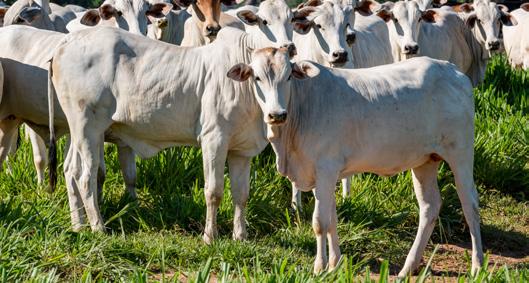
3 minute read
TaKING THE BULL BY THE HORNS – TIME FOR SUPPLY CHaIN aCTION
TaKING THE BULL BY THE HORNS
– TIME FOR SUPPLY CHaIN aCTION
‘ all economic partners of Brazil should share the blame for indirectly promoting deforestation and GHG emissions by not barring imports and consuming agricultural products contaminated with deforestation, illegal or not.’407
Raoni Rajão et al, Science, July 2020
‘Food system changes that reduce GHG emissions may offer additional benefits, including progress toward targets set in the United Nations’ Sustainable Development Goals, such as decreased nutrient pollution, reduced water pollution and scarcity, decreased land-use change, improved biodiversity outcomes, and, if dietary composition and caloric consumption are improved, reduced prevalence of obesity, diabetes, heart disease, and premature mortality.
Time is of the essence in addressing GHG emissions. any delays will necessitate more ambitious and expeditious implementation of emissions reduction strategies if global temperature targets are to be met. We show that there are many opportunities to keep emissions from food systems and other activities within the global emissions limits for the 1.5° and 2°C targets.’ 408 ‘To secure a thriving food system for the future, the food industry as a whole has an opportunity – and responsibility – to help mitigate the impacts of climate change and find more sustainable ways to feed people. at McDonald’s, our responsible sourcing strategy includes a climate action target to reduce greenhouse gas emissions intensity in our supply chain by 2030, as well as a commitment to eliminate deforestation from our global supply chains by 2030, prioritising by end of 2020 the raw materials we buy in the greatest volume: beef, chicken (including soy in feed), palm oil, coffee and the fibre used in guest packaging. … We work closely with our biggest suppliers in the product categories in which we can have the greatest impact and actively encourage these suppliers to set targets, measure and report emissions and take action to make reductions. We know we cannot drive industry-wide change alone, and we encourage all companies to work collaboratively on solutions.’409
McDonald’s spokesperson, quoted in Food Navigator, 12 November 2020
Rapid and systemic transformation of the industrial meat sector will be critical to addressing the present triple threat of climate change, biodiversity loss and vulnerability to novel diseases.410 Governments, financial institutions and the private sector alike need to swap empty rhetoric for action and assume their responsibility for tackling these crises. Radical action is needed from governments, the finance sector, supermarkets and fast food companies to ensure that policy, finance and trade drive – rather than undermine – the urgently needed shift to resilient food economies that permit the restoration and regeneration of natural ecosystems, ensure the preservation of biodiversity, rein in GHG emissions and uphold the rights of communities and workers.
Financial institutions must recognise that JBS does not represent a responsible investment and withhold their support from its proposed NYSE listing. More broadly, they must ensure much tougher environmental scrutiny of all companies producing or trading in so-called forest and ecosystem risk commodities (FERCs), withholding investment and financial services from those that cannot show their supply chains are free from ecosystem destruction.
Food sector companies must similarly increase environmental scrutiny of all their FERC suppliers and exclude non-compliant companies, including JBS and its subsidiaries. In the longer term they must aim to phase out sales of industrially produced meat from all sources, recognising that even those parts of the sector (such as intensive chicken production) that are not major direct drivers of deforestation are heavily dependent on the highly destructive feed industry.411
The example of JBS also highlights the need for all governments – be they FERC-producing countries such as Brazil or importing blocs such as the EU – to have in place zero deforestation laws and regulations requiring producers and processors of FERCs as well as operators placing FERCs and derived products on consumer markets to meet strictly defined sustainability criteria and to ensure full supply chain traceability and transparency. This means that, in all markets where FERCs are produced or consumed, efforts to end links to deforestation should be underpinned by due diligence legislation to ensure that commodities and products are not linked to deforestation, ecosystem destruction and abuses of human rights. Such legislation should include measures for financial institutions that invest in or lend to companies producing or trading in FERCs.








